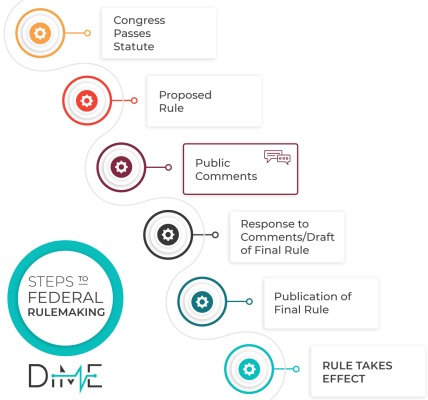
If you want to improve US healthcare during COVID-19, submit a public comment
You hold the power to inform effective, ethical, and safe use of digital health technologies, during the COVID-19 crisis and beyond
As the COVID-19 pandemic continues, digital technologies are rapidly being adopted to support health, healthcare, and health research. Researchers and public health officials across the country are deploying wearable technologies to seek early warning signals of potential new COVID-19 hot spots. Healthcare systems across the country are rolling out chatbots to serve as COVID-19 symptom checkers to triage patients at home. Telehealth is skyrocketing.
When faced with fear, it is normal to want to throw whatever tools are available at the problem. But “more tech” has not always served healthcare — ask any doctor if they like their computer! And the public has grown weary of perceived abuses by tech companies. So, short of tossing tech at the wall like spaghetti, what can you do to make healthcare implementations work better during COVID-19?
You may not realize that you have access to a high-impact pathway to influence healthcare: You can submit a public comment to shape federal rule-making.
I had not heard of the public comment process before I started working with government agencies. So if you haven’t either, that’s not a problem! That’s why DiMe has developed tools to make the commenting process easier for you to get involved. This month, DiMe launched a new Federal Comment Toolkit featuring lists, tips, tricks, and comment examples.
You hold the power to influence tomorrow’s policies
Moments of crisis create unique opportunities for system-level change. The decisions that governments, clinicians, and other individuals make over the coming weeks and months will impact our lives for years to come as many short-term emergency measures are likely to be permanently adopted.
Consider the PATRIOT Act of 2001, which granted broad government surveillance permissions for 14 years in the wake of the 9/11 terrorist attacks. Or the New Deal, enacted in 1935 during the Great Depression, which launched Social Security — a move that will benefit 65 million Americans this year.
As described by Mina Hsiang, former U.S. Digital Service: Whenever an agency is proposing a brand-new regulation or a change to an existing one (which is happening at a rapid pace during COVID-19), it must do it in two critical phases:
- First, the agency will post a draft and ask the public to comment on it. Anyone can comment: experts in the field, startups, corporations, lobbying groups, and concerned citizens — and you have 30–60 days to comment.
- Next, agency service members take the comments, go back to their offices, read and digest the comments, and write a final version.

Put another way: government officials may not be responding to your Tweets, but they are required to read and respond to your public comments.
Over the past few weeks, the FDA released multiple new guidelines relevant to digital health, including but not limited to ones on remote monitoring, clinical trials, and digital therapeutics. All are currently open for public comment and serve as ripe opportunities for us to mold which pathway our country will take.
Shape the future of digital medicine
In line with our long-standing commitment to commenting, no matter how intimidating, DiMe has been sharing feedback and insights from our community by submitting comments, including two since the outbreak:

We recognize that while DiMe can synthesize ideas from our broad and diverse community, we won’t be able to capture all the nuance from our expert community. To make it easy for each individual and organization to provide broad expert input to the next generation of digital regulation in healthcare, we have launched DiMe’s Federal Comment Toolkit.
Within the Toolkit, you will find a list of federal regulations related to digital health that are open for comment and provide tips and tricks for writing your own comment, along with a selection of examples for you to reference.

We encourage you to use the DiMe comments when they align with your own perspective
We encourage everyone to ‘rip, borrow, and steal’ from DiMe comments — with attribution. These comments are crafted based on what we have learned from you, our members at DiMe. We listen carefully to the field, we reference our community’s expertise, and we try to distill that in each of our comments. DiMe comments are shared work products and you should feel comfortable including feedback that resonates in your own comments.
If you decide to use concepts from public DiMe documents, we do not require that you cite every word or phrase individually, but rather we ask that you:
- Note that you built upon concepts from a DiMe comment in your introduction, and
- Provide a list of all related comments that you used in the appendix of your comment
Your voice matters
Whether you are a citizen scientist or a data scientist, an engineer or an ethicist, a physician or a pharmacist, your voice matters as the regulations that govern the future of digital medicine are established.
And if you don’t comment, who will? Who will speak for you? As Mina Hsiang aptly noted: US agencies are required to read what you write, and they need to hear from more Americans outside the beltway.
Over the upcoming months and years, you can expect that DiMe will continue to comment and participate in the rulemaking process related to the future of our field. We also believe that DiMe should not be the lone voice in the wilderness. This DiMe community of experts is extraordinary, uniquely diverse in expertise, and eminently qualified to co-create responsible and reasonable guardrails to govern the digital health industry.
Please exercise your civic duty to engage in the rulemaking process and help to advance digital medicine to optimize health. Take the first step by checking out the DiMe Federal Comment Toolkit. Then, hop on over to the #federalcomment channel in the DiMe Slack to see what your colleagues are working on.
Acknowledgements: Many thanks to Lucia Savage, John Wilbanks, and Cat Cole for your critical contributions to developing the DiMe Federal Comment Toolkit. And thank you to Andy Coravos and and Mina Hsiang for your input to this piece.



